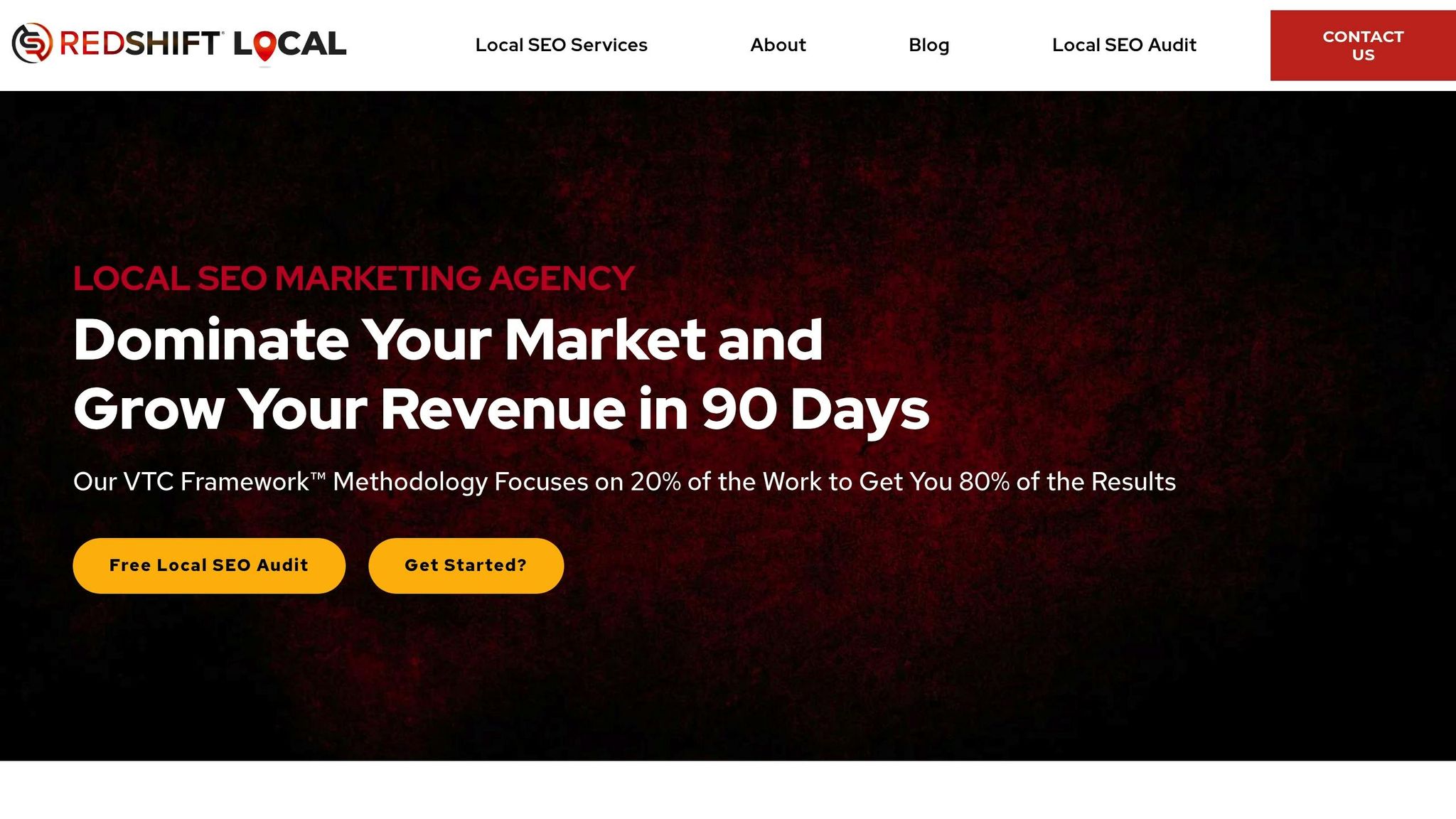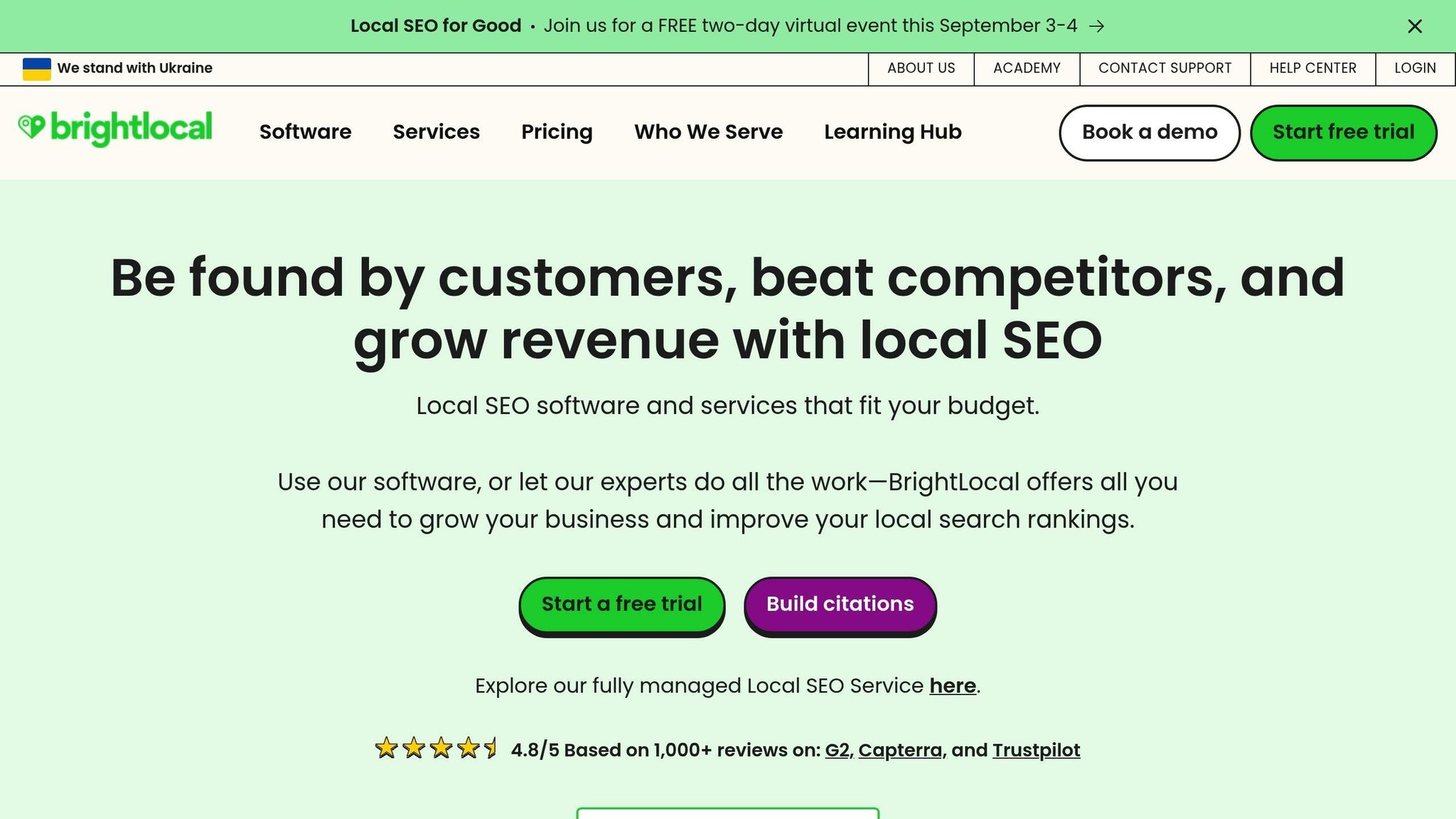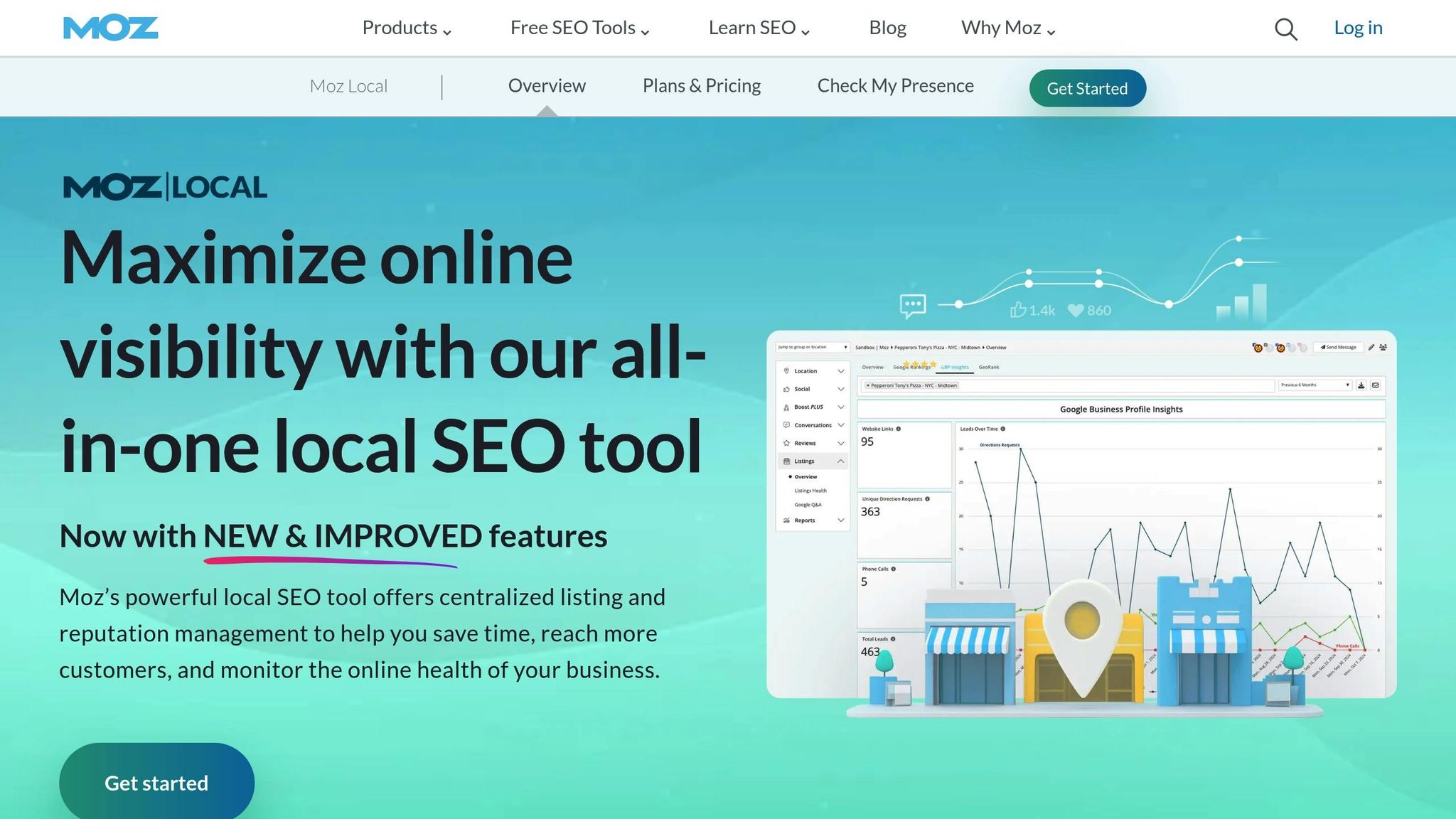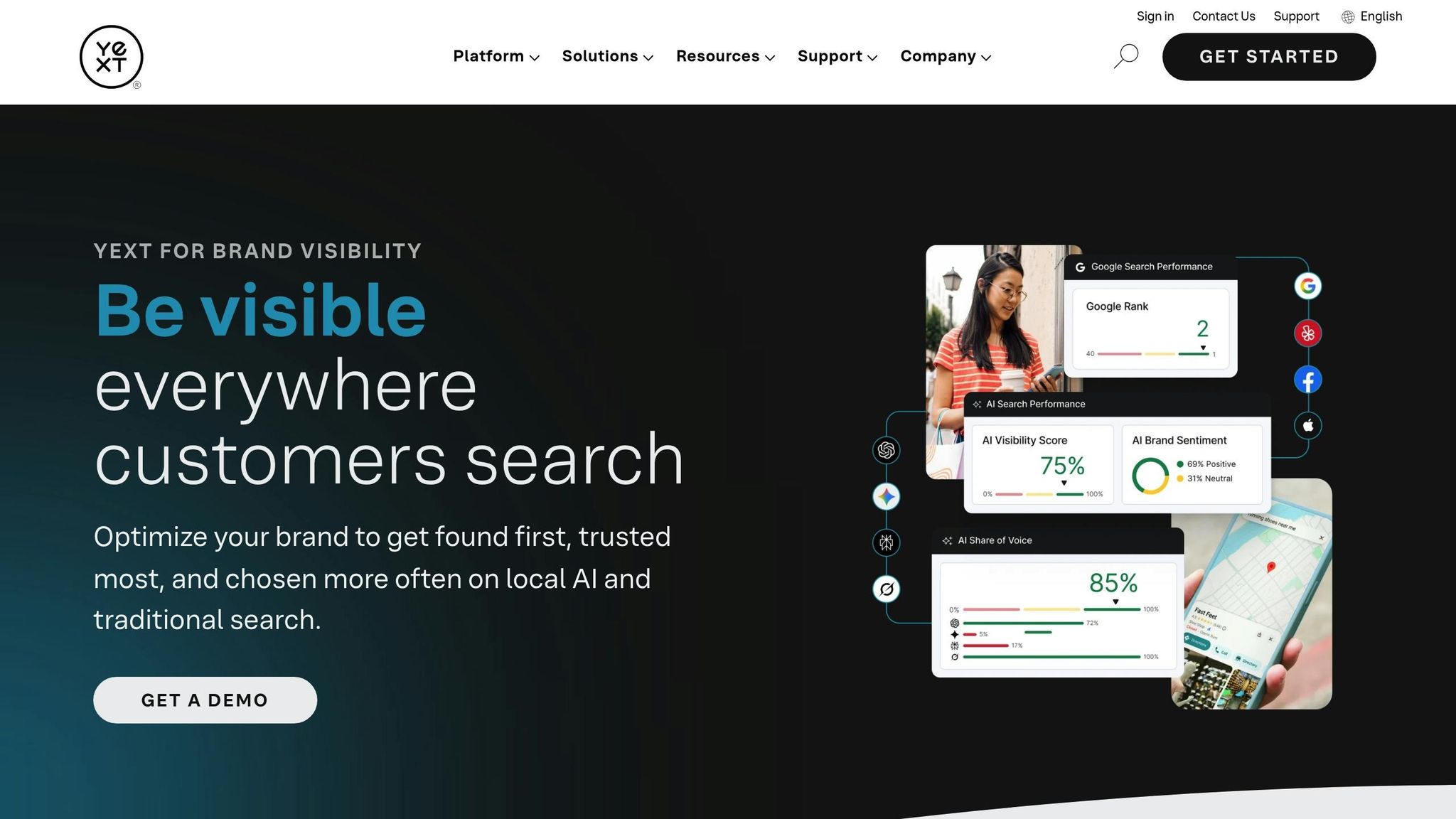Local citations – mentions of your business name, address, and phone number (NAP) – are essential for local search visibility. For businesses with multiple locations, managing citations accurately can significantly influence search rankings and customer trust. The key is maintaining consistent and accurate NAP data across platforms like
Google Business Profile,
Yelp, and
Apple Maps.
Here’s what you need to know:
- Challenges: Inconsistent NAP data, duplicate listings, and outdated information can confuse search engines and customers, hurting visibility and trust.
- Solutions: Use a master spreadsheet to organize location data, prioritize high-impact directories, and conduct regular audits to fix errors.
- Tools: Platforms like RedShift Local, BrightLocal, Moz Local, and Yext simplify citation management with automation and tracking.
Accurate citations are a critical factor in improving local SEO and ensuring customers can easily find and trust your business.
Multi-Location Citation Management Challenges
Handling citations for multiple locations can quickly turn into a logistical headache. What might seem like a straightforward process for a single location becomes a maze of details when scaled to dozens – or even hundreds – of outlets. Below, we’ll explore some of the key challenges businesses face when managing multi-location citations.
NAP Consistency Requirements
Keeping Name, Address, and Phone (NAP) information consistent across all platforms is no small feat for multi-location businesses. Every directory, review site, and platform must display identical details for each location. This task becomes even trickier when trying to balance corporate branding guidelines with the unique needs of local markets.
Take, for instance, a franchise restaurant chain. While corporate might enforce strict naming conventions, a particular outlet might be better known locally by a slightly different name. Phone numbers can also complicate things – some locations may use corporate call-routing systems, while others rely on local numbers. Even small changes, like area code updates, require swift, widespread updates to avoid confusion.
Address formatting is another common pitfall. One platform might list a location as “123 Main St.”, while another uses “123 Main Street, Suite A.” These minor inconsistencies might not seem like a big deal, but they can confuse search engines and hurt local search rankings.
Common Citation Problems
NAP consistency isn’t the only hurdle. Other issues include duplicate listings and outdated information, which often arise when new locations are added without checking for existing entries. This can lead to conflicting records that are difficult to manage.
Branding inconsistencies are another challenge. If some locations operate under slightly different names or offer unique services, citation sources may reflect these variations in ways that confuse customers. For example, a location-specific service might be omitted from some listings, leaving potential customers in the dark. Managing operational details like hours of operation, holiday schedules, or accepted payment methods adds yet another layer of complexity that requires constant vigilance.
Effects on Visibility and Customer Trust
When citations are inconsistent, the consequences can ripple through a business’s online presence. Search rankings often take a hit, and customer trust can erode. Imagine a customer showing up at a location only to find outdated hours or an incorrect address. These kinds of frustrations can lead to negative impressions, hurting both reputation and revenue.
Multi-location businesses also face competition on two fronts: local competitors and other outlets within their own chain. Inconsistent citations can result in one location competing against another in search results, splitting click-through rates and confusing customers about which branch serves their area. Even a minor NAP error can snowball, turning into a time-intensive cleanup project that drains resources.
Addressing these challenges is essential before diving into targeted citation-building strategies. For multi-location businesses, focusing on the most impactful platforms rather than chasing perfection across every directory can help minimize inconsistencies and maximize results where it matters most.
How to Build and Manage Citations Step-by-Step
Managing citations for multiple locations can feel overwhelming, but a systematic approach can simplify the process and help maintain consistent, accurate data. The trick is to start with a strong foundation, carefully organize your information, and then stay on top of updates over time.
Data Preparation and Organization
Start by creating a
master spreadsheet that consolidates all your location data. This will serve as your go-to reference for every piece of information about your business locations. Include key details like:
- Exact business name
- Complete address with consistent formatting
- Primary phone number
- Website URL
- Business hours for each day
- Business categories
- High-quality photos
To make tracking easier, add columns for submission status on major platforms like
Google Business Profile and
Yelp. Once you’ve created directory listings, link to their URLs in the spreadsheet to monitor progress and identify gaps.
Consistency is critical. Decide on uniform formatting for addresses (e.g., “Street” vs. “St.”) and phone numbers (e.g., (555) 123-4567 vs. 555-123-4567), and stick to it across all entries. This level of detail helps search engines recognize and trust your information.
Don’t overlook business hours. Since hours can vary by location and change seasonally, create separate columns for
regular hours,
holiday hours, and
special schedules. This level of organization ensures accurate information for both customers and search engines.
Once your data is in order, the next step is auditing existing citations to ensure accuracy.
Citation Audit Process
Before diving into new directory submissions, you need to know what’s already out there. Start with the
big three platforms: Google Business Profile, Yelp, and Facebook. Search for each location using variations of your business name and address to uncover existing listings.
Conduct targeted Google searches using combinations like “business name” + “city name” + “phone number” to find citations across other websites. Pay attention to shortened names or minor spelling differences, as these can lead to duplicate or incorrect listings.
Document all findings in your master spreadsheet, noting any discrepancies in NAP (Name, Address, Phone) information, outdated photos, or duplicate entries. This will help you prioritize cleanup efforts before moving on to new submissions.
Don’t forget about
Apple Maps and
Bing Places. These platforms are often overlooked but are essential for visibility, especially since Apple Maps powers Siri search results. Include their status in your tracking system for a complete picture.
Use the insights from your audit to guide your next steps in building accurate, impactful citations.
Directory Submission Process
Start by submitting to high-authority directories. Your first priorities should be
Google Business Profile,
Yelp,
Facebook, and
Apple Maps, as they have the most influence on local search rankings.
Next, focus on
industry-specific directories. For example:
These niche directories often attract users with specific needs, making them valuable for driving targeted traffic.
When submitting to directories, fill out every field completely. Upload high-quality photos, write detailed business descriptions, and select all relevant categories. Many platforms allow multiple categories – use this to highlight different aspects of your business.
If a directory offers verification, complete the process right away. Verified listings not only rank higher but also give you control over updates. Verification methods typically include phone calls, postcards, or email confirmations, so prepare for these steps, especially if managing multiple locations.
Citation Maintenance and Updates
Once your citations are live, regular maintenance is essential. Set up
monthly reviews to check for unauthorized changes, new reviews, or technical issues on key platforms like Google Business Profile, Yelp, and Facebook. User-generated edits can introduce errors, so monitoring is crucial.
When a location updates its phone number, hours, or address, start by updating your master spreadsheet. Then, systematically update all directory listings, starting with the most critical platforms. For duplicate entries, follow the platform’s specific process to merge them properly and retain any reviews or engagement attached to the listing.
For businesses with many locations, manual monitoring can become overwhelming. Consider using
automated tools to track changes across multiple directories. These tools can alert you to unexpected updates or new citations, saving time and ensuring accuracy.
RedShift Local offers a streamlined way to handle citation audits and updates. By focusing on the directories that matter most for your business type and location, they help maximize local visibility while keeping your resources focused on what truly drives results. Staying proactive with these practices ensures your citations remain a strong foundation for long-term success.
Managing citations for businesses with multiple locations can be a daunting task. Automated tools make this process much easier by ensuring accuracy and saving time. Below, we explore some of the top tools designed to simplify citation management.

RedShift Local takes a targeted approach to citation management, focusing on the directories and platforms that matter most for your business. Instead of spreading efforts thin across countless minor directories, they zero in on the key sources that significantly impact your local search visibility.
Their free local SEO audit is a great starting point. It identifies gaps and inconsistencies in your citations across major directories like Google Business Profile, Yelp, Apple Maps, and niche-specific platforms. For businesses with multiple locations, RedShift Local also offers ongoing Google Business Profile optimization and management services. This ensures your listings stay accurate and engaging, which can boost your local search performance over time.

BrightLocal offers a robust solution for businesses looking to maintain accurate local listings across multiple locations. With their citation tracker, you can scan a wide range of directories to see where your business is listed and identify any NAP (Name, Address, Phone) inconsistencies.
One standout feature is their bulk submission tool, which lets you submit multiple locations to multiple directories simultaneously. BrightLocal also keeps an eye on your listings, sending alerts if there are unexpected changes. Their reporting dashboard provides health scores for each location, making it easy to prioritize updates and showcase progress to stakeholders.

Moz Local is all about keeping your NAP information consistent across major directories and data aggregators. The platform automates updates, ensuring any changes you make are quickly distributed to connected directories.
Its duplicate detection feature is particularly useful, as it consolidates conflicting listings. Moz Local also performs a gap analysis to show which directories are missing your business and prioritizes them based on their relevance and authority in your industry. With real-time sync capabilities, updates like new business hours or phone numbers are reflected promptly across all connected platforms.

Yext serves as a central hub for managing your business information across a wide network of directories, search engines, and apps. It connects with major platforms like Google, Facebook, Yelp, and Apple Maps, ensuring your updates are distributed across all of them within one to two days.
Beyond citation management, Yext offers tools to consolidate customer reviews into a single dashboard and provides analytics to track how customers interact with your listings. You can see which directories drive the most engagement, whether through phone calls, website visits, or direction requests. For businesses managing a large number of locations, Yext also includes bulk management tools and API integrations, making it easier to implement updates when your internal systems change.
Citation Building Best Practices and Mistakes to Avoid
Building on the earlier guidelines for citation setup and maintenance, here are some practical tips to boost your multi-location visibility while steering clear of common pitfalls.
Citation Building Best Practices
Centralize your location data. Start with a master file that serves as the single source of truth for all your business locations. Update this file first before making changes across directories to ensure consistency.
Accuracy comes first. During the initial setup, take the time to verify your information. Use tools like Google Maps or even make direct phone calls to confirm details before submitting them.
Complete every profile. Fully filled-out directory profiles tend to rank better in local searches and offer more useful information to potential customers. Don’t leave any fields blank.
Audit regularly. Plan quarterly reviews of your citations, focusing first on the top 20–30 directories that matter most to your business. Frequent updates – like new phone numbers, revised hours, or rebranded locations – make these audits essential.
Track your submissions. Use a tracker to log every directory you’ve submitted to, along with submission dates and statuses. This helps you avoid duplicates and keeps updates organized.
Start with data aggregators. Platforms like
Acxiom,
Factual, and
Neustar Localeze distribute your business information to numerous smaller directories. Getting your details right with these aggregators can improve your presence across many platforms at once.
Citation Building Mistakes to Avoid
Overlooking industry-specific directories. General platforms like Yelp and Google are important, but don’t ignore specialized directories. For instance, restaurants should consider OpenTable or
Zomato, while medical practices benefit from listings on healthcare-focused platforms.
Inconsistent formatting. Variations like “Street” versus “St.” or inconsistent phone number formats confuse both search engines and customers. Stick to uniform formatting across all directories.
Ignoring duplicate listings. Duplicate entries with slightly different information can hurt your local search rankings. Search engines struggle to determine which listing is correct, often penalizing all versions. Actively find and merge duplicates to maintain clarity.
Relying on bulk submissions without customization. Each directory may have unique formatting rules, category options, or required fields. Skipping this step during bulk uploads can lead to rejected submissions, creating more work later.
Neglecting ongoing maintenance. Citation management isn’t a one-and-done task. As business details change or directories update their requirements, your listings need attention. Set up a monitoring system to catch and fix issues quickly.
Manual vs. Automated Citation Management
Deciding between manual and automated citation management depends on your business’s needs. Here’s a quick comparison:
| Approach |
Pros |
Cons |
| Manual Management |
Full control over every listing; allows for tailored information on niche directories; avoids subscription fees; direct communication with directory support |
Time-consuming, especially for multiple locations; prone to human error; hard to scale beyond a handful of locations; challenging to maintain frequent updates |
| Automated Management |
Efficient for managing hundreds of locations; minimizes human error with standardized processes; offers centralized reporting and monitoring; scales easily as your business grows |
Higher costs upfront and ongoing; less flexibility for directory-specific customization; technical issues can disrupt multiple listings; may overlook niche directories not covered by the system |
For most multi-location businesses, a
hybrid approach works best. Use automated tools to manage major directories at scale, while manually handling specialized or high-priority platforms that require extra attention. This balance ensures efficiency without sacrificing quality or visibility.
Building Strong Foundations for Local Visibility
Effectively managing citations for businesses with multiple locations requires a strategy that balances accuracy with efficiency. Ensuring consistent NAP (Name, Address, Phone Number) data across hundreds of directories, avoiding duplicate entries, and keeping information up to date are ongoing tasks. Yet, the rewards – improved local search visibility and stronger customer trust – make the effort well worth it.
Consistency in your NAP data is critical. When your business information aligns across all platforms, search engines and customers are more likely to trust your locations. On the flip side, discrepancies can erode that trust, impacting both rankings and customer confidence.
One way to stay on top of this is by maintaining a master spreadsheet as your centralized reference point. Pair this with regular audits to catch inconsistencies early and a set schedule for updates. This combined approach leverages the efficiency of automation for major directories while allowing for the detailed attention needed for niche or industry-specific platforms.
For businesses with dozens – or even hundreds – of locations, scaling citation management can be daunting. This is where expert support can make a difference. Agencies like RedShift Local specialize in simplifying the process through services like
Local Citation Audits, Citation Cleanup, and Citation Building. Their focus on maintaining
NAP consistency ensures that your Google Business Profile and directory listings work together seamlessly, building trust with both search engines and potential customers.
While citation management services can range from $300 to $5,000 per month, this investment lays a solid foundation for your local SEO efforts. When done right, it creates a reliable system that helps customers find your locations and trust the information they see.
FAQs
How can businesses with multiple locations maintain consistent NAP information across platforms?
To keep your
NAP (Name, Address, Phone) details consistent across platforms, businesses with multiple locations should create a separate Google Business Profile for each location. Make sure the formatting of NAP information is identical across all profiles. Regular updates – like adjusting hours, adding fresh photos, or revising contact details – are key to maintaining accuracy.
You should also audit citations on online directories to correct any inconsistencies, implement schema markup on your website for each location, and include all addresses on your social media profiles, making use of location tags. Keeping your NAP details consistent not only boosts local SEO but also builds trust with search engines and reinforces your business’s credibility.
How can I audit and keep citations accurate for businesses with multiple locations?
To ensure your citations stay accurate for multi-location businesses, it’s important to regularly review and update your listings. Aim to audit them every quarter or whenever there are changes to key business details. Cross-check all listings against a centralized database to guarantee
consistent NAP (Name, Address, Phone number) information across all platforms.
Citation management tools can make this task easier by quickly spotting and fixing inconsistencies. Keeping your information up-to-date helps avoid outdated or mismatched details, which can negatively impact your local SEO. Staying on top of this process helps your business remain visible and trustworthy in local search results.
For multi-location businesses, focusing on
high-authority directories and
industry-specific platforms is a smart move. Why? Because it strengthens your online visibility and helps boost local search rankings. Platforms like Google Business Profile carry a lot of weight in search results, giving your business added credibility and making it easier to stand out.
Industry-specific platforms, on the other hand, target niche audiences actively searching for services like yours. This means you’re more likely to connect with potential customers who are already interested in what you offer. Plus, keeping your business information accurate and consistent across these platforms builds trust and reinforces your brand’s dependability. Not only does this improve your local SEO, but it also ensures customers can find and choose your business with ease.
Related Blog Posts
 RedShift Local takes a targeted approach to citation management, focusing on the directories and platforms that matter most for your business. Instead of spreading efforts thin across countless minor directories, they zero in on the key sources that significantly impact your local search visibility.
Their free local SEO audit is a great starting point. It identifies gaps and inconsistencies in your citations across major directories like Google Business Profile, Yelp, Apple Maps, and niche-specific platforms. For businesses with multiple locations, RedShift Local also offers ongoing Google Business Profile optimization and management services. This ensures your listings stay accurate and engaging, which can boost your local search performance over time.
RedShift Local takes a targeted approach to citation management, focusing on the directories and platforms that matter most for your business. Instead of spreading efforts thin across countless minor directories, they zero in on the key sources that significantly impact your local search visibility.
Their free local SEO audit is a great starting point. It identifies gaps and inconsistencies in your citations across major directories like Google Business Profile, Yelp, Apple Maps, and niche-specific platforms. For businesses with multiple locations, RedShift Local also offers ongoing Google Business Profile optimization and management services. This ensures your listings stay accurate and engaging, which can boost your local search performance over time.
 BrightLocal offers a robust solution for businesses looking to maintain accurate local listings across multiple locations. With their citation tracker, you can scan a wide range of directories to see where your business is listed and identify any NAP (Name, Address, Phone) inconsistencies.
One standout feature is their bulk submission tool, which lets you submit multiple locations to multiple directories simultaneously. BrightLocal also keeps an eye on your listings, sending alerts if there are unexpected changes. Their reporting dashboard provides health scores for each location, making it easy to prioritize updates and showcase progress to stakeholders.
BrightLocal offers a robust solution for businesses looking to maintain accurate local listings across multiple locations. With their citation tracker, you can scan a wide range of directories to see where your business is listed and identify any NAP (Name, Address, Phone) inconsistencies.
One standout feature is their bulk submission tool, which lets you submit multiple locations to multiple directories simultaneously. BrightLocal also keeps an eye on your listings, sending alerts if there are unexpected changes. Their reporting dashboard provides health scores for each location, making it easy to prioritize updates and showcase progress to stakeholders.
 Moz Local is all about keeping your NAP information consistent across major directories and data aggregators. The platform automates updates, ensuring any changes you make are quickly distributed to connected directories.
Its duplicate detection feature is particularly useful, as it consolidates conflicting listings. Moz Local also performs a gap analysis to show which directories are missing your business and prioritizes them based on their relevance and authority in your industry. With real-time sync capabilities, updates like new business hours or phone numbers are reflected promptly across all connected platforms.
Moz Local is all about keeping your NAP information consistent across major directories and data aggregators. The platform automates updates, ensuring any changes you make are quickly distributed to connected directories.
Its duplicate detection feature is particularly useful, as it consolidates conflicting listings. Moz Local also performs a gap analysis to show which directories are missing your business and prioritizes them based on their relevance and authority in your industry. With real-time sync capabilities, updates like new business hours or phone numbers are reflected promptly across all connected platforms.
 Yext serves as a central hub for managing your business information across a wide network of directories, search engines, and apps. It connects with major platforms like Google, Facebook, Yelp, and Apple Maps, ensuring your updates are distributed across all of them within one to two days.
Beyond citation management, Yext offers tools to consolidate customer reviews into a single dashboard and provides analytics to track how customers interact with your listings. You can see which directories drive the most engagement, whether through phone calls, website visits, or direction requests. For businesses managing a large number of locations, Yext also includes bulk management tools and API integrations, making it easier to implement updates when your internal systems change.
Yext serves as a central hub for managing your business information across a wide network of directories, search engines, and apps. It connects with major platforms like Google, Facebook, Yelp, and Apple Maps, ensuring your updates are distributed across all of them within one to two days.
Beyond citation management, Yext offers tools to consolidate customer reviews into a single dashboard and provides analytics to track how customers interact with your listings. You can see which directories drive the most engagement, whether through phone calls, website visits, or direction requests. For businesses managing a large number of locations, Yext also includes bulk management tools and API integrations, making it easier to implement updates when your internal systems change.
 RedShift Local takes a targeted approach to citation management, focusing on the directories and platforms that matter most for your business. Instead of spreading efforts thin across countless minor directories, they zero in on the key sources that significantly impact your local search visibility.
Their free local SEO audit is a great starting point. It identifies gaps and inconsistencies in your citations across major directories like Google Business Profile, Yelp, Apple Maps, and niche-specific platforms. For businesses with multiple locations, RedShift Local also offers ongoing Google Business Profile optimization and management services. This ensures your listings stay accurate and engaging, which can boost your local search performance over time.
RedShift Local takes a targeted approach to citation management, focusing on the directories and platforms that matter most for your business. Instead of spreading efforts thin across countless minor directories, they zero in on the key sources that significantly impact your local search visibility.
Their free local SEO audit is a great starting point. It identifies gaps and inconsistencies in your citations across major directories like Google Business Profile, Yelp, Apple Maps, and niche-specific platforms. For businesses with multiple locations, RedShift Local also offers ongoing Google Business Profile optimization and management services. This ensures your listings stay accurate and engaging, which can boost your local search performance over time.
 BrightLocal offers a robust solution for businesses looking to maintain accurate local listings across multiple locations. With their citation tracker, you can scan a wide range of directories to see where your business is listed and identify any NAP (Name, Address, Phone) inconsistencies.
One standout feature is their bulk submission tool, which lets you submit multiple locations to multiple directories simultaneously. BrightLocal also keeps an eye on your listings, sending alerts if there are unexpected changes. Their reporting dashboard provides health scores for each location, making it easy to prioritize updates and showcase progress to stakeholders.
BrightLocal offers a robust solution for businesses looking to maintain accurate local listings across multiple locations. With their citation tracker, you can scan a wide range of directories to see where your business is listed and identify any NAP (Name, Address, Phone) inconsistencies.
One standout feature is their bulk submission tool, which lets you submit multiple locations to multiple directories simultaneously. BrightLocal also keeps an eye on your listings, sending alerts if there are unexpected changes. Their reporting dashboard provides health scores for each location, making it easy to prioritize updates and showcase progress to stakeholders.
 Moz Local is all about keeping your NAP information consistent across major directories and data aggregators. The platform automates updates, ensuring any changes you make are quickly distributed to connected directories.
Its duplicate detection feature is particularly useful, as it consolidates conflicting listings. Moz Local also performs a gap analysis to show which directories are missing your business and prioritizes them based on their relevance and authority in your industry. With real-time sync capabilities, updates like new business hours or phone numbers are reflected promptly across all connected platforms.
Moz Local is all about keeping your NAP information consistent across major directories and data aggregators. The platform automates updates, ensuring any changes you make are quickly distributed to connected directories.
Its duplicate detection feature is particularly useful, as it consolidates conflicting listings. Moz Local also performs a gap analysis to show which directories are missing your business and prioritizes them based on their relevance and authority in your industry. With real-time sync capabilities, updates like new business hours or phone numbers are reflected promptly across all connected platforms.
 Yext serves as a central hub for managing your business information across a wide network of directories, search engines, and apps. It connects with major platforms like Google, Facebook, Yelp, and Apple Maps, ensuring your updates are distributed across all of them within one to two days.
Beyond citation management, Yext offers tools to consolidate customer reviews into a single dashboard and provides analytics to track how customers interact with your listings. You can see which directories drive the most engagement, whether through phone calls, website visits, or direction requests. For businesses managing a large number of locations, Yext also includes bulk management tools and API integrations, making it easier to implement updates when your internal systems change.
Yext serves as a central hub for managing your business information across a wide network of directories, search engines, and apps. It connects with major platforms like Google, Facebook, Yelp, and Apple Maps, ensuring your updates are distributed across all of them within one to two days.
Beyond citation management, Yext offers tools to consolidate customer reviews into a single dashboard and provides analytics to track how customers interact with your listings. You can see which directories drive the most engagement, whether through phone calls, website visits, or direction requests. For businesses managing a large number of locations, Yext also includes bulk management tools and API integrations, making it easier to implement updates when your internal systems change.

